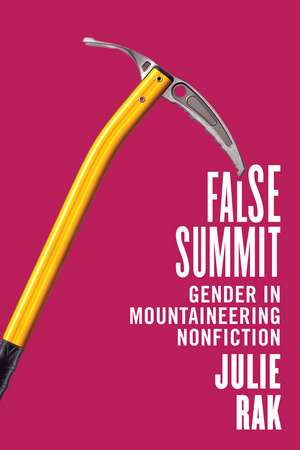False Summit: Gender in Mountaineering Nonfiction
Autor Julie Raken Limba Engleză Paperback – 14 apr 2021
The race to climb Everest catapulted mountain climbing, with its accompanying images of conquest and sport, into the public sphere on a global scale. But as a metaphor for the pinnacle of human achievement, mountaineering remains the preserve of traditional white male heroism.False Summit unpacks gender politics in the expedition narratives and memoirs of mountaineers in the Himalayas and the Karakoram. Why are women still a minority in the world's highest places? Julie Rak proposes that the genre has itself reached a "false summit" – a peak that proves not to be the pinnacle – and that mountaineering is not ready to welcome other ways of climbing or other kinds of climbers. For more than two centuries mountaineering, as an activity and as an ideal, has helped shape how the self is understood within the context of conquest, adventure, and proximity to risk. As climbing shows signs of becoming more diverse, Rak asks why change is so hard to achieve and why gender bias and other inequities exist in climbing at all.Exploring classic and lesser-known expedition accounts from Everest, K2, and Annapurna, False Summit helps us understand why mountaineering remains one of the most important ways to articulate gender identities and politics.
Preț: 268.44 lei
Nou
Puncte Express: 403
Preț estimativ în valută:
51.37€ • 53.44$ • 42.41£
51.37€ • 53.44$ • 42.41£
Carte disponibilă
Livrare economică 25 martie-08 aprilie
Livrare express 08-14 martie pentru 32.78 lei
Preluare comenzi: 021 569.72.76
Specificații
ISBN-13: 9780228006275
ISBN-10: 0228006279
Pagini: 272
Ilustrații: 9 photos, 1 map
Dimensiuni: 152 x 229 x 20 mm
Greutate: 0.4 kg
Editura: McGill-Queen's University Press
Colecția McGill-Queen's University Press
ISBN-10: 0228006279
Pagini: 272
Ilustrații: 9 photos, 1 map
Dimensiuni: 152 x 229 x 20 mm
Greutate: 0.4 kg
Editura: McGill-Queen's University Press
Colecția McGill-Queen's University Press
Recenzii
"False Summit is a welcome addition to the scholarship on mountaineering, gender, and environmental studies." Canadian Literature
“Julie Rak’s book reveals that certain issues deserve to be questioned, notably through the study of the mountaineers who reach these false summits and who are more representative of mountaineers as a mixed social group. It is up to historians then to renew their sources to include all mountaineers.” International Journal of the History of Sport
“Julie Rak’s False Summit is the most important work on gender and mountaineering in many years. The gender politics of climbing Annapurna, K2, and Mount Everest were recorded in nonfiction writing over the last century. For even longer, images of mountaintop figures standing above a sea of clouds (à la Caspar David Friedrich) have invited viewers to imagine themselves in the summit position of the sovereign individual. Rak notes that to substitute someone else into this position requires an equivalence, a form of physical embodiment, that often excludes those who are not white, male, and Euro-American. These challenges make it difficult for others to occupy this position which creates the “false summit” of the book’s title. False Summit should be widely read and will have an impact in many fields and in areas well beyond the mountains.” JAAAS: of Austrian Association for American Studies
"Rak provides a convincing analysis of gender in mountaineering on Annapurna, K2, and Everest that will reshape how climbers and readers understand who belongs in the mountains, the politics of style in climbing and writing, and the possibilities for more inclusive stories in the future." Peter Hansen, Worcester Polytechnic Institute
"The rewards of False Summit are many, not least of which is the opening up of the critical field for further scholarship focusing on other 'non-traditional' mountaineering bodies. Rak has the rare ability to combine sophisticated critical thinking with direct formulations of insights and a wonderfully accessible writing style." Amrita Dhar, Ohio State University
Notă biografică
Julie Rak is professor of English and film studies and holds the Henry Marshall Tory Chair at the University of Alberta.
Descriere
The race to climb Everest catapulted mountain climbing, with its accompanying images of conquest and sport, into the public sphere on a global scale. But as a metaphor for the pinnacle of human achievement, mountaineering remains the preserve of traditional white male heroism. Exploring classic and lesser-known expedition accounts from Everest, K2, and Annapurna, False Summit helps us understand why mountaineering remains one of the most important ways to articulate gender identities and politics.
